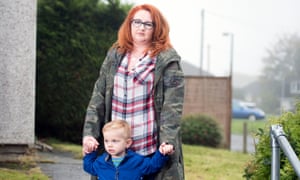Personal Independence Payments – the points-based system for disability claims – only works for people with physical disabilities, say campaigners. We meet some of those who feel they have slipped through the net

Kloey Clarke at home in Devizes, with her son Seth.
Photograph: Adrian Sherratt for the Guardian
Kloey Clarke, 28, from Devizes in Wiltshire, has had severe anxiety and type II bipolar disorder for six years. “I’m scared to leave the house,” says Clarke, who does not feel emotionally or physically stable enough to hold down a job and relies on her husband for care and support. “I have a constant fear of dying. I can’t socialise and I can’t communicate outside [the house].” For four years, Clarke depended on a Disability Living Allowance (DLA). The DLA was replaced by Personal Independence Payments (PIPs) in 2012 – and phased in from 2013 – but she was receiving them for less than a year before she was reassessed by the Department for Work and Pensions (DWP) and told she no longer qualified.
Clarke believes that the assessment for PIP is aimed at people with physical disabilities and does not account for mental illness. “I was asked if I could walk 200 metres unaided. No, I don’t need a stick or an aid, but I do need my husband or someone with me. Can I talk to people face to face? I talk to my family when they visit, but can I speak to strangers? No.”
She has had panic attacks as a consequence of losing her benefits, she says, and her family is now struggling financially. They have had to visit food banks twice since being rejected for PIP, but Clarke’s pride has stopped her from going more frequently. “I just find it so degrading. I don’t feel as if I should be there. I feel that, if I just had what I deserve, then I wouldn’t need to be in that place; I wouldn’t need to take food from, say, homeless people.”
Continue reading
No comments:
Post a Comment